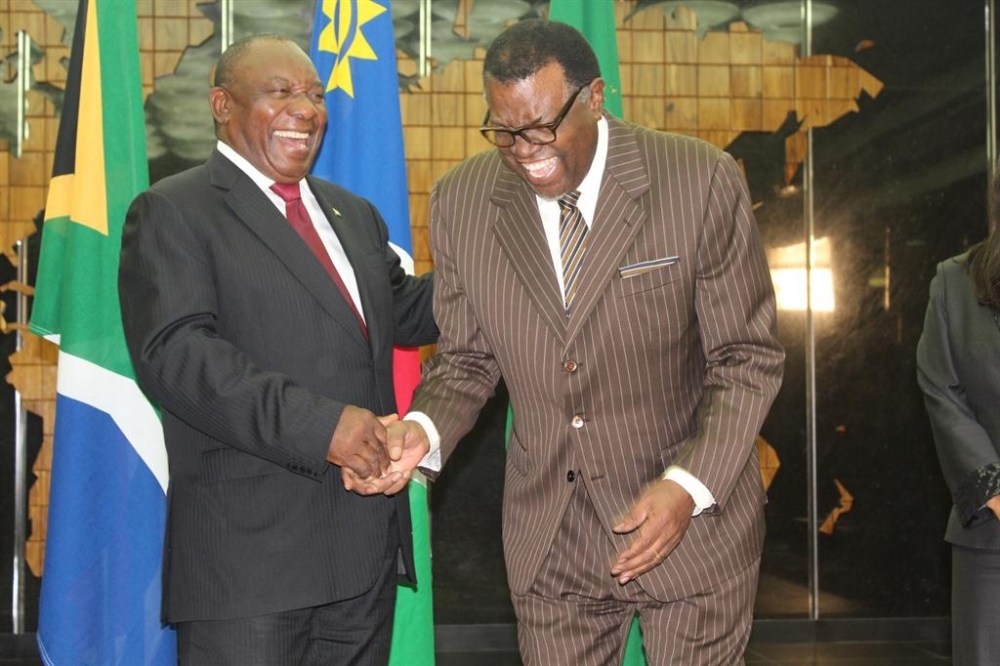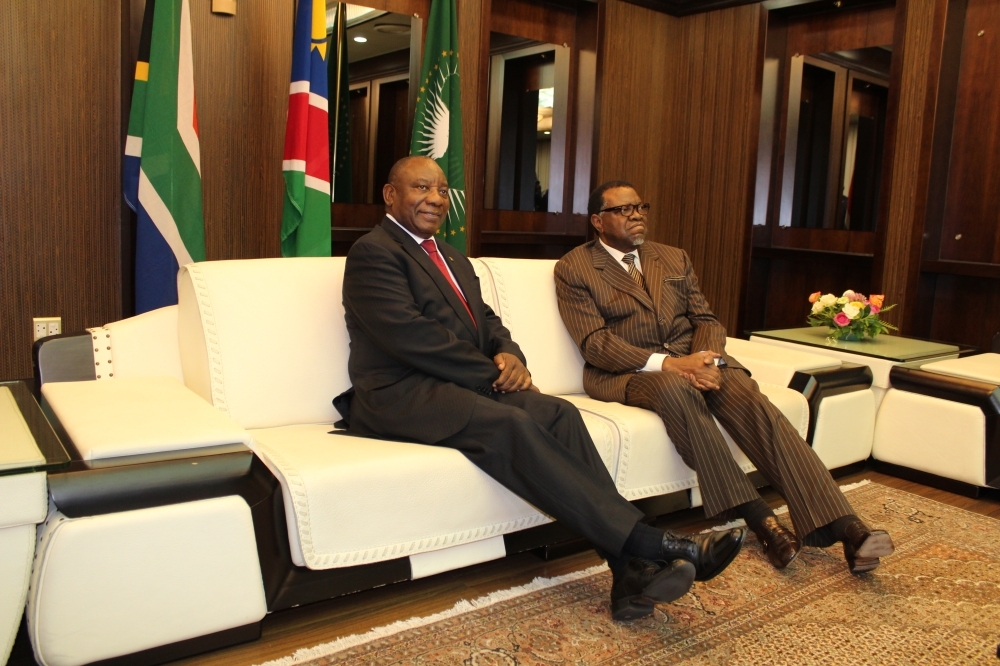Beyond laughter and pleasantries
• Geingob to South Africa for State visit
Beyond casual camaraderie and far away from flashing cameras, President Geingob's state visit to South Africa carries much hope for Namibia.
TOIVO NDJEBELAWindhoek
President Hage Geingob’s state visit to South Africa this Thursday – the first by a Namibian head of state in 11 years – comes at a time when Namibia is trying to emerge from the economic shadows of its proverbial big brother.
The last state visit, by former president Hifikepunye Pohamba, was in 2012.
When Namibia gained independence in 1990, she was dubbed “a new small state with a powerful neighbour”, in reference to South Africa, whose economic dominance of the region has remained as strong as it ever was.
Export statistics from the South African Revenue Service (SARS) for January to February this year show Namibia is South Africa’s fourth biggest African export destination, with 11.59% (around N$9 billion) of that country’s African exports going to their northern neighbour.
The top three African export destinations for South Africa are Mozambique, Botswana and Zimbabwe – in that order.
Economist Dr John Steytler, Geingob’s former economic advisor, believes Namibia is slowly reaching levels where she can also help South Africa in a major way as an economic partner.
“South Africa is no longer the big brother that helps Namibia. Namibia, with its present position and potential oil and green hydrogen activities, is now in a position to help its big brother,” he told Namibian Sun.
Family meeting
At a global level, Namibia gobbles up 3% of South African exports.
Between January and February, South Africa’s top three exports to Namibia were machinery (19.9%), vehicles, aircraft and vessels (14.7%), and prepared foodstuffs (13.42%).
In 2022, South Africa imported N$16.1 billion worth of goods from Namibia, while South Africa exported goods and services to the value of N$56.5 billion to Namibia.
“This state visit cannot be called anything but a family meeting if you look at how close South Africa and Namibia are aligned and intertwined from a trade and socio-economic point of view,” Steytler said.
The South African presidency announced Geingob’s planned visit last week. The trip aims to solidify bilateral relations between the two countries, as well as discuss regional, continental and international matters of mutual concern, president Cyril Ramaphosa’s spokesperson, Vincent Magwenya, said.
Unholy brotherhood?
Opposition leader Dr Panduleni Itula of the Independent Patriots for Change (IPC) yesterday welcomed the state visit.
“As former comrades in arms having trained for the struggle for democratisation and independence, we share a common history and our relationship shall continue, premised on those shared historical and economic factors,” he said.
Itula, however, expressed concern over Namibia’s heavy reliance on its neighbour for energy supply, equating the situation to ‘economic sabotage’.
“Socio-economic development without a reliable source of energy is unlikely to be sustainable,” he said.
The IPC leader said both Geingob and Ramaphosa are reigning over nations with high levels of corruption and, in the case of South Africa, lawlessness.
“The continued deterioration of safety and security in South Africa is of concern and our head of state would do well imposing strict border controls. ID requirements for access, as is the case with Botswana, should not be encouraged at this stage.”
Stench of corruption
He also hit out the levels of corruption in both countries, which has also implicated the two leaders’ names.
“Regrettably, the occupants of both institutions have been subjects of governance breaches and serious allegations of corruption in their respective countries,” Itula said.
The two heads of state have their names implicated in the Phala Phala saga, in which Ramaphosa allegedly lost millions of dollars to Namibian suspects who looted his farm in Limpopo.
“Both political parties the two heads of government preside over are seeing declining popularity, traditional voters are extremely sceptical and allegiances have changed,” Itula remarked.
No faith
Exiled Namibian academic Professor Joseph Diescho, who for long worked for the University of South Africa (Unisa) before his ill-fated stay in Namibia when he worked for the Namibia Institute of Public Administration and Management (Nipam), has no faith in the state visit.
“One is right to anticipate that the two hamstrung leaders will wish to have a quiet moment to discuss their Phala Phala activities away from the media, hopefully during loadshedding when cameras are without power,” he said, tongue in cheek.
The state visit will be preceded by a bilateral meeting between South African minister of international relations Naledi Pandor and her Namibian counterpart, Netumbo Nandi-Ndaitwah, which is slated for tomorrow in South Africa.
The Namibian presidency said a statement on Geingob’s visit will be released today.
President Hage Geingob’s state visit to South Africa this Thursday – the first by a Namibian head of state in 11 years – comes at a time when Namibia is trying to emerge from the economic shadows of its proverbial big brother.
The last state visit, by former president Hifikepunye Pohamba, was in 2012.
When Namibia gained independence in 1990, she was dubbed “a new small state with a powerful neighbour”, in reference to South Africa, whose economic dominance of the region has remained as strong as it ever was.
Export statistics from the South African Revenue Service (SARS) for January to February this year show Namibia is South Africa’s fourth biggest African export destination, with 11.59% (around N$9 billion) of that country’s African exports going to their northern neighbour.
The top three African export destinations for South Africa are Mozambique, Botswana and Zimbabwe – in that order.
Economist Dr John Steytler, Geingob’s former economic advisor, believes Namibia is slowly reaching levels where she can also help South Africa in a major way as an economic partner.
“South Africa is no longer the big brother that helps Namibia. Namibia, with its present position and potential oil and green hydrogen activities, is now in a position to help its big brother,” he told Namibian Sun.
Family meeting
At a global level, Namibia gobbles up 3% of South African exports.
Between January and February, South Africa’s top three exports to Namibia were machinery (19.9%), vehicles, aircraft and vessels (14.7%), and prepared foodstuffs (13.42%).
In 2022, South Africa imported N$16.1 billion worth of goods from Namibia, while South Africa exported goods and services to the value of N$56.5 billion to Namibia.
“This state visit cannot be called anything but a family meeting if you look at how close South Africa and Namibia are aligned and intertwined from a trade and socio-economic point of view,” Steytler said.
The South African presidency announced Geingob’s planned visit last week. The trip aims to solidify bilateral relations between the two countries, as well as discuss regional, continental and international matters of mutual concern, president Cyril Ramaphosa’s spokesperson, Vincent Magwenya, said.
Unholy brotherhood?
Opposition leader Dr Panduleni Itula of the Independent Patriots for Change (IPC) yesterday welcomed the state visit.
“As former comrades in arms having trained for the struggle for democratisation and independence, we share a common history and our relationship shall continue, premised on those shared historical and economic factors,” he said.
Itula, however, expressed concern over Namibia’s heavy reliance on its neighbour for energy supply, equating the situation to ‘economic sabotage’.
“Socio-economic development without a reliable source of energy is unlikely to be sustainable,” he said.
The IPC leader said both Geingob and Ramaphosa are reigning over nations with high levels of corruption and, in the case of South Africa, lawlessness.
“The continued deterioration of safety and security in South Africa is of concern and our head of state would do well imposing strict border controls. ID requirements for access, as is the case with Botswana, should not be encouraged at this stage.”
Stench of corruption
He also hit out the levels of corruption in both countries, which has also implicated the two leaders’ names.
“Regrettably, the occupants of both institutions have been subjects of governance breaches and serious allegations of corruption in their respective countries,” Itula said.
The two heads of state have their names implicated in the Phala Phala saga, in which Ramaphosa allegedly lost millions of dollars to Namibian suspects who looted his farm in Limpopo.
“Both political parties the two heads of government preside over are seeing declining popularity, traditional voters are extremely sceptical and allegiances have changed,” Itula remarked.
No faith
Exiled Namibian academic Professor Joseph Diescho, who for long worked for the University of South Africa (Unisa) before his ill-fated stay in Namibia when he worked for the Namibia Institute of Public Administration and Management (Nipam), has no faith in the state visit.
“One is right to anticipate that the two hamstrung leaders will wish to have a quiet moment to discuss their Phala Phala activities away from the media, hopefully during loadshedding when cameras are without power,” he said, tongue in cheek.
The state visit will be preceded by a bilateral meeting between South African minister of international relations Naledi Pandor and her Namibian counterpart, Netumbo Nandi-Ndaitwah, which is slated for tomorrow in South Africa.
The Namibian presidency said a statement on Geingob’s visit will be released today.





Comments
Namibian Sun
No comments have been left on this article